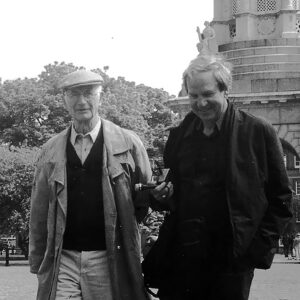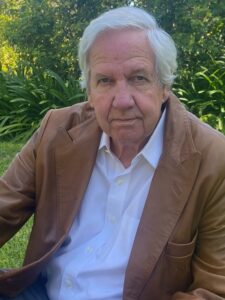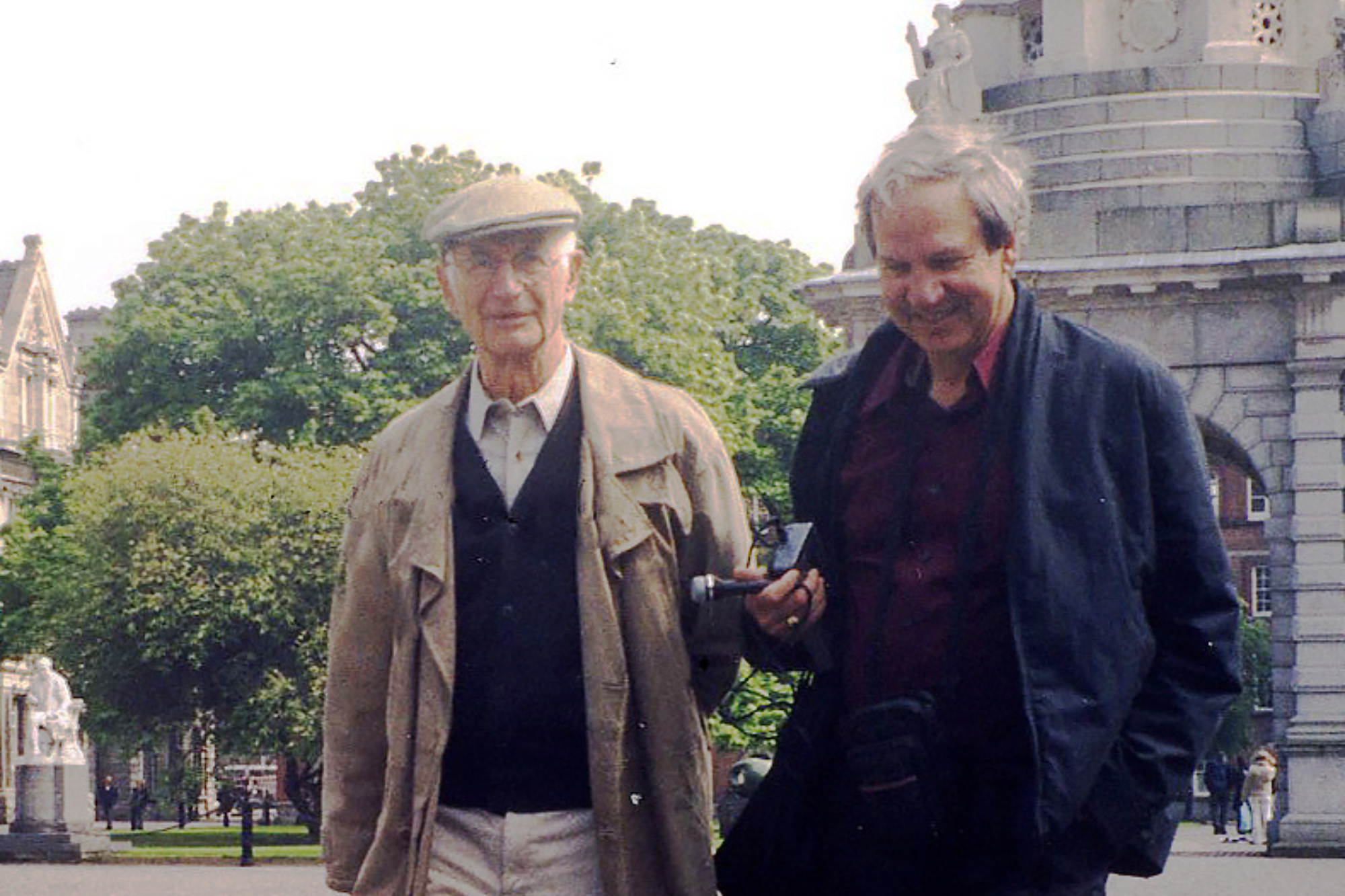 As part of Pacifica’s Journeys of the Soul Conference, an immersive weekend of learning and connecting at Pacifica Graduate Institute to be held September 29 – October 1, Dick Russell, an award-winning investigative journalist and author of a biographical trilogy, The Life and Ideas of James Hillman, will be participating in an author salon with PGI faculty Dr. Dylan Hoffman.
As part of Pacifica’s Journeys of the Soul Conference, an immersive weekend of learning and connecting at Pacifica Graduate Institute to be held September 29 – October 1, Dick Russell, an award-winning investigative journalist and author of a biographical trilogy, The Life and Ideas of James Hillman, will be participating in an author salon with PGI faculty Dr. Dylan Hoffman.
Angela: You are an author and environmental journalist, who was not associated with the field of psychology previous to meeting James Hillman. And over the course of nearly twenty years, you wrote three volumes of James Hillman’s biography, which by necessity must be couched in psychology. How has your own interest in and relationship with psychology evolved over the years? Is this your first time appearing at Pacifica or is there a deeper past there?
Dick: I spoke at Pacifica on ecology a few years ago, about climate change and the world’s oceans. I saw James Hillman speak there a number of times and interviewed a lot of people at Pacifica about him. So I have a long history with Pacifica itself.
I’d been an avid reader of Jung’s work, which I discovered in my twenties. Then later, a group of friends and I came across James Hillman and were talking a lot about his book The Soul’s Code and reading the Blue Fire Anthology. That led to meeting him, and a friendship developed over the course of time.
The subject came up about his biography and whether I might consider doing it. He didn’t want a psychologist, someone with judgements or preconceived ideas about psychology. So for me it was a long and fascinating journey, exploring how his life and ideas overlapped. In the course of this I learned so much from him and colleagues that I met about depth psychology. The challenge was to transpose excerpts from his books and letters, along with the dozens of interviews, into something that would elucidate Hillman’s life and archetypal psychology.
He and I sat down for many interviews. I would share chapters with him as they were written, and he would expand on the various themes. It started out to be a single book, that’s what he and I discussed. But the book kept expanding. After James died in 2011, I began working on a second volume. Then that couldn’t cover the rest of his life either. Altogether I’ve written about 2,000 pages on the man and his impact on psychology. Volume 2 just came out last month, and Volume 3 will be published in the fall.
Angela: By a narrow margin of fate, involving a root vegetable, you first became connected with James Hillman. How did you meet, what drove you to make that connection, and what was your first impression of him?
Dick: Well, I had a friend in Connecticut who was a farmer and his son happened to mention that his father sold Hillman organic vegetables at the local market. (He later inscribed one of his books to my wife: “We were brought together not by fate, but by Wayne’s potato.”)
So I asked if my friend might be able to arrange a meeting. He wasn’t sure because Hillman was a very private person, but I sent along a copy of my book, Black Genius And the American Experience, and he agreed to have lunch.
My first impression was that he was a definitely a scholarly erudite man, but at the same time, very down to earth. We had several common interests. We’d both traveled in Africa in our twenties, and we were both boxing fans. He was active in local environmental issues, as was I.
Angela: As a writer, you took your task to be telling the life story of a remarkable person in the field of psychology. Do you see any arc or evolution in his life that is revealed by Volume 3?
Dick: I would say that in the later part of his life, his third wife, the artist Margot McLean, helped kindle his interest in the aesthetic and what he called the poetic basis of mind. Also his earlier work was often considered denser and more difficult, but the later work was written in a more accessible style. And he mellowed as a person and teacher. He wasn’t as tough on his students as he was when he was younger.
Angela: Are there any revelations about Hillman in the book that might surprise readers?
Dick: Readers may be surprised at how willing Hillman was to dive into the unknown. He left Zurich, where he’d lived for 25 years, and settled in Dallas for 6 years in the late 1970s. That was a very curious move to a lot of people. He taught at a Catholic university there, then co-founded an institute that focused on “the soul of the city.” Then he and his second wife Patricia Berry moved to Connecticut, where Hillman became involved in the mytho-poetic men’s movement. He spent a decade working alongside the poet Robert Bly and the story-teller Michael Meade, with groups of men who came together to get to the deeper questions of life. This erudite intellectual ended up going off into the woods, making masks, doing rituals that became profoundly important for himself as well as the others. I delve into this amazing story in Volume 2.
Angela: Hillman certainly played a large part in the genesis of Pacifica and is beloved to us as a founding scholar in depth psychology. Did he speak about Pacifica with you? Is that present in the books?
Dick: Yes, I devote an entire chapter to his relationship with Pacifica in Volume 3. I interviewed a number of your school’s professors and attended a number of lectures and symposiums that Hillman gave there. I also describe his friendship with Marshall Chrostowski, the landscaper who designed the beauty of the campus; Hillman himself loved gardening. Pacifica gave him a West Coast home base in a sense, a place that welcomed him where he could sound out new ideas and refresh old ones.
Angela: Are there any moments with him that you carry with you as special?
Dick: Yes. He was extremely helpful to me in a family crisis with my son, who had been diagnosed with a serious mental illness. I would often be embarrassed by things my son said and would correct him in public. One day, James tuned in to the fact that I was suffering. He suggested that I just treat my son like a regular person and stop trying to change him. Once I began doing that, our relationship changed. And in the process, I became appreciative of my son’s remarkable qualities, including his ability to tune into my thoughts and to other realities. Hillman also introduced me to a colleague in the men’s movement named Malidoma Somé. I wrote a memoir about this called My Mysterious Son: A Life-Changing Passage Between Schizophrenia and Shamanism.
Angela: What are you most looking forward to in your author salon with Dylan?
Dick: Dylan actually handled the copyediting on the biography’s second and third volumes and did an amazing job, which is how I came to know him. I’m very excited about engaging in a dialogue with him about how James Hillman’s remarkable life is reflected in his ideas about the internal world and the importance of addressing deeper questions that lead us toward fulfilling our soul’s code, as much as we can.
Angela: Thank you so much for speaking with me. I wish you the best of luck in your continued journalistic success. Are there any projects forthcoming from you that we should look for?
Dick: I just published another biography titled The Real RFK Jr.: Trials of a Truth Warrior. It might interest people to know that the son of Robert Kennedy, a longtime friend and colleague in environmental activism is a longtime student of Jung and depth psychology. I met him around the same time I met James Hillman. I’m also working on a podcast series with Rob Reiner about the JFK assassination. And I have a project co-authoring a book with a young African American who is a genius in mythology and with whom I’ve had a mentoring relationship for the past eight years.
To join us for the author screening with Dick Russell, and connect with other nationally recognized leaders, scholars, and authors, please join us for Journey Week, September 27, 2023-October 1, 2023.

Angela Borda is a writer for Pacifica Graduate Institute, as well as the editor of the Santa Barbara Literary Journal. Her work has been published in Food & Home, Peregrine, Hurricanes & Swan Songs, Delirium Corridor, Still Arts Quarterly, Danse Macabre, and is forthcoming in The Tertiary Lodger and Running Wild Anthology of Stories, Vol. 5.

Dick Russell has published fifteen non-fiction books on subjects ranging from natural history to the hidden history of our era, including three New York Times best-sellers. Eye of the Whale was named a Best Book of 2001 by three major newspapers. The Man Who Knew Too Much was lauded as “a masterpiece of historical reconstruction.” He was also a recipient of the 1987 citizen’s Chevron Conservation Award for his environmental activism.


